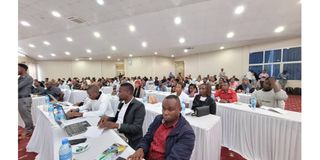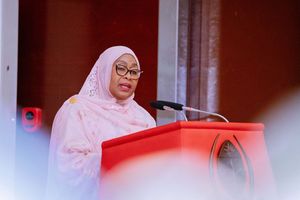Tanzania’s youth, women challenged to meet AfCFTA market demands

Participants attentively listen to presentations during a training session for women and youth engaged in cross-border trade. The training focused on highlighting business opportunities in the African free trade market and equipping them with the knowledge to overcome challenges and maximize economic benefits through the Youth Entrepreneurship for the Future of Food (YEFFA) program, which took place in Arusha on Friday, March 28, 2025. PHOTO| BERTHA ISMAIL
What you need to know:
- In 2022, Sub-Saharan Africa's imports totaled $421.52 billion, while exports stood at $396.40 billion, resulting in a trade deficit of $25.12 billion. This highlights the pressing need for African nations to enhance their production capacity and reduce dependence on imports.
Arusha. Youth and women in Tanzania have been encouraged to focus on producing high-quality products capable of competing in the global market to fully benefit from the African Continental Free Trade Area (AfCFTA) agreement.
AfCFTA is a significant trade initiative designed to unite African nations by eliminating trade barriers, such as tariffs and other restrictions, within the continent.
The agreement also aims to foster economic cooperation among African countries and reduce their reliance on imported goods.
In 2022, Sub-Saharan Africa's imports totaled $421.52 billion, while exports stood at $396.40 billion, resulting in a trade deficit of $25.12 billion. This highlights the pressing need for African nations to enhance their production capacity and reduce dependence on imports.
The Tanzania Chamber of Commerce, Industry, and Agriculture (TCCIA) director, Mr Oscar Kisanga, emphasised this during a training session for women and youth engaged in cross-border trade on March 28, 2025.
The training, part of the Youth Entrepreneurship for the Future of Food program (Yeffa), was designed to highlight the business opportunities in the African free trade market and equip participants with the necessary knowledge to overcome challenges and maximize economic benefits.
Mr Kisanga stated that African stakeholders are currently discussing the AfCFTA, focusing on empowering youth and women producers to eliminate trade barriers.
He emphasized that by 2030, businesses producing their goods would be able to sell them tariff-free across Africa, a continent of over 1.6 billion people.
“These discussions are focused on ensuring that by 2030, traders producing their goods can sell them across Africa without tariffs. At present, we are offering training to youth and women, who represent the majority in trade, to ensure they produce high-quality goods that meet the standards of the AfCFTA market,” he insisted.
The Alliance for a Green Revolution in Africa (AGRA) Associate Program Officer, Mr Donald Mizambwa, said the training extends beyond businesspeople to include youth and women dealing with agriculture.
The aim is to educate them on business opportunities in agri-business, including the production of high-quality crops like maize and beans.
Mr Mizambwa stressed the importance of understanding market challenges and how to address them, including reporting issues to the relevant authorities.
He noted that Africa continues to face significant food sufficiency challenges, with a recent showing that the continent imports about $50 billion worth of food annually, a figure expected to rise to $90-$110 billion by 2025 unless substantial changes are made.
He said this dependency on food imports places Africa at the mercy of volatile global markets, jeopardizing food security, economic resilience, and agricultural sustainability.
“This dependency on imported food raises critical questions about food security, economic resilience, and Africa’s long-term agricultural sustainability,” he said.
Arusha Region Trade Officer, Mr Njivainei Mollel, highlighted ongoing efforts to identify and address trade barriers to enhance regional trade.
He reassured the government's commitment to reducing non-tariff barriers, especially those affecting youth and women engaged in cross-border agricultural trade, which would ultimately benefit both individuals and the nation.
A participant, Ms Vannesa Paul, expressed her appreciation for the training, noting that it had taught them how to report trade barriers digitally to resolve issues efficiently.
She also expressed her eagerness to learn more about cross-border business opportunities.
“We are grateful for these discussions, which have educated us on recognising opportunities beyond our country and how to report trade barriers effectively. We believe that investing in agriculture will grow our personal and national economies,” said Ms Paul.




